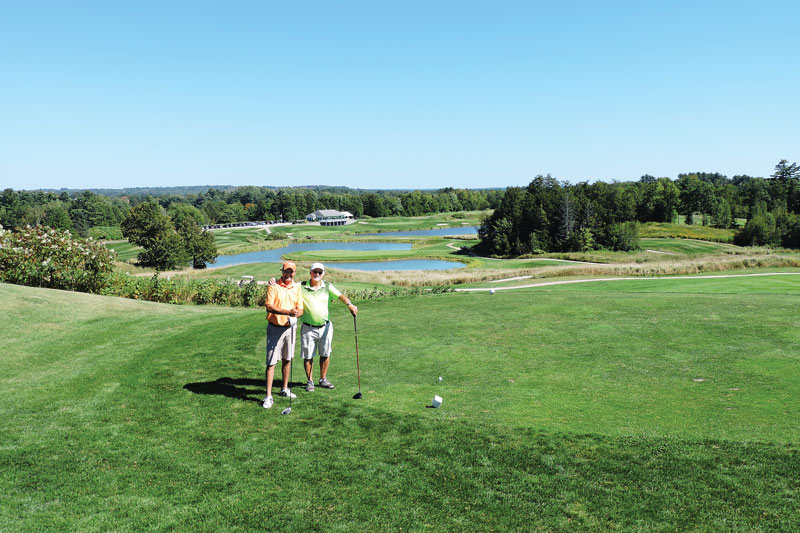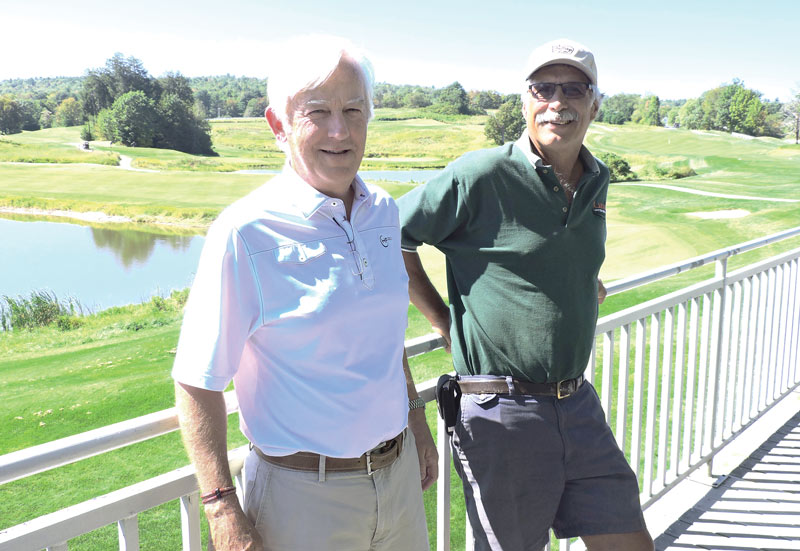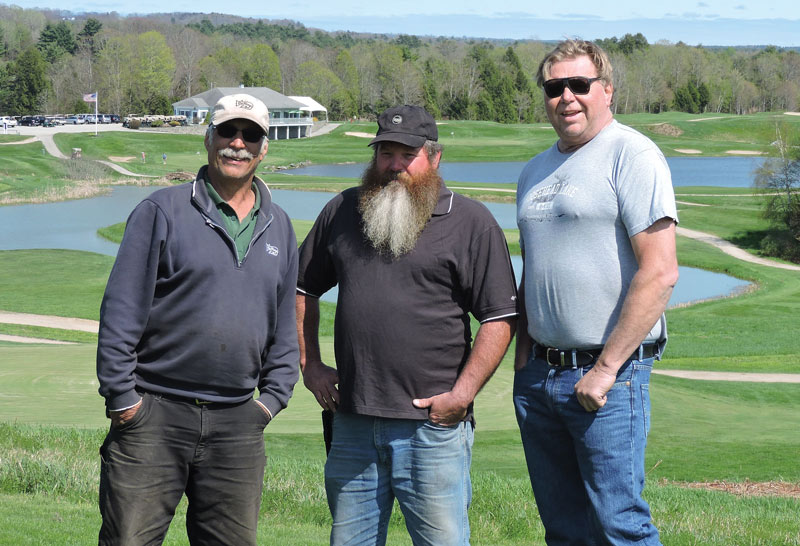
Ed Michaud, superintendent at Fox Ridge Golf Club in Auburn, Maine, in the landing area above the 10th green, one of the 18-hole course’s notable par 4s. Photos courtesy of Mark Leslie
It’s Dec. 11 in Maine, and Dan Boulet and Dan Lavoie are pulling into Fox Ridge Golf Club to play 18 holes at their favorite course. With no snow on the ground, temperatures in the 40s and a full-sun sky, it’s the perfect day to prove Boulet’s pronouncement: “This course is in great shape year-round. We’ll play today, tomorrow and maybe Thursday.”
“It can’t get any better than this — the friendly people, the great golf course,” adds Lavoie, who has played many of his 70 rounds this year at the course designed and built by longtime superintendent Ed Michaud and golf course builders Lennie Myshrall and Paul Lessard.
For the “three amigos,” originally united by their desire to build a memorable golf course they could call their own, the past 16 years have driven them to exhilaration and discouragement, exhaustion and rejuvenation.
Would they do it again? Without a doubt. Would they change the process? Unequivocally. Have they learned any lessons? You bet.
The caveat: finances.
“I’d do it again in a heartbeat — with someone else’s money,” laughs Michaud, a 39-year GCSAA member who spent his first 20 years in the business as superintendent at the No. 1 public course in New England: Sugarloaf Golf Club, a spectacular gem in the mountains of Maine designed by Robert Trent Jones Jr.
In fact, it was Michaud’s achievements at Sugarloaf combined with a cavalier statement in a feature article about him that led to the three men’s partnership in the first place. Michaud was renowned in the summertime for Sugarloaf Golf Club’s championship conditioning, and in the wintertime, he earned the moniker “Crazy Eddie” for creating snowboarding parks at American Ski Co. properties across the country, including at Sugarloaf USA. In that feature article, the past president of the Maine GCSA remarked, “I’d like to get my hands on a 200-acre farm to build a golf course. Something tells me it would be unorthodox.”
A team takes shape
At that point, hunting and fishing pals Myshrall and Lessard didn’t know Michaud. But all that was about to change. Myshrall, who had happened upon a 240-acre farm for sale in Auburn, Maine, read the article about Michaud, declared, “Aha,” and called the superintendent. The rest is the history of Fox Ridge Golf Club, a four-and-a-half-star beauty of a course that rocks and rolls where 90 dairy cows used to graze.
“People say Donald Ross got all the choice pieces of ground in New England,” Michaud says. “Well, he missed this one. This was a beautiful spot to build a golf course.”
The trio’s history has been filled with highs, lows, and myriad emotions in between.
Michaud, Myshrall and Lessard quickly became a three-stranded cord, both for their love for the outdoors — attested to by a pro shop that, until recently, was adorned with multiple hunting and fishing trophies — and hard labor. With Horizon Golf owner Myshrall doing most of the design from his kitchen table and the three working from dawn to past-dark, Michaud says, “We came in and built, grew in and opened the course in 14-and-a-half months, which is unheard of, even in Florida. Considering the winter, we basically built 18 holes in one summer. We got open at the end of June 2001 with no clubhouse, and by that fall, the clubhouse was up.”

Fox Ridge members Dan Lavoie (left) and Dan Boulet enjoy the view from the second tee with the peninsula fifth green behind them.
The three men give immense credit to the late Ken Anderson, a retired businessman and part-owner of highly regarded The Ledges in Wells, Maine, who became a 51 percent partner when funds ran dry.
Indeed, Anderson’s untimely death in a car accident not long after the opening was a devastating loss for his family as well as Fox Ridge.
“Our plan was to build three courses — one for Ken to give each of his sons,” Michaud says. “I keep telling Lennie that he owes it to the world. On his very first try, he gets four-and-a-half stars! I mean, look around (at the course).”
With a ranking by Golf Digest as Maine’s fifth-best public or private course, Fox Ridge has Maine golfers hoping for a sequel. Lavoie, a Fox Ridge member, gives it this pitch: “The people are friendly. The leagues are unreal. Wednesday night, Monday night, Tuesday night. On Thursdays, they have the points system. It’s a great golf club.” Boulet, who played 80 to 90 rounds in 2017, adds, “This course is immaculate and well-maintained. Eddie does a hell of a job.”
That stern test led to Fox Ridge hosting the Maine Open for three years, its clubhouse offering perfect spectator seating via a patio overlooking the pond-fronted ninth and 18th greens. The first year of the Open, Myshrall told Michaud, “I’d love to see par win it, Eddie.” Sure enough, Ricky Jones won it at even par. The last round, he teed off at 3-under-par and shot 3-over that day.
“The last year,” Michaud recalls, “MSGA (Maine State Golf Association) executive director Nancy Storey asked that we soften the course a little. We did, and 6-under won it.”
But did the attention foretell Fox Ridge II? The clue to the answer is the caveat: money.
“I haven’t gotten a paycheck yet,” says Myshrall. “The taxes were $5,000 when we bought it, and now it’s up to $62,000, and we’ve gotten nothing from the town but one streetlight.”
“Ken had the money, and it would have worked if he were still with us,” Michaud says. “It would have been a lot different, I think. We’d be smiling today. He was a true businessman. He would have paid the bills and made sure we had enough left over to make improvements. ... We just don’t have the money, and certainly not enough to keep a new course afloat for the first five or six years while it gets known and busy.”
Myshrall is still building holes and renovating golf courses, mostly in Maine. Lessard is out of the golf business. Michaud is a constant presence as Fox Ridge’s superintendent/part-owner, and the course is seeing sunnier skies with a new management company on board.
The cavalry arrives at Fox Ridge
H&F Golf Management of Scarborough, Maine, took over management of Fox Ridge two years ago, and has undertaken an aggressive campaign to “soften” the course. When H&F came into the picture, co-owner Dan Horahan brought in his own PGA pro and food-and-beverage manager, and told Michaud, “Eddie, you’re doing great; just keep up doing what you’re doing.”
“Fox Ridge is one of the most creative designs in Maine,” Horahan says. “It’s got great par 5s, spectacular par 3s, and enough variety in its par 4s to keep it distinctive, with doglegs left and right, uphill, downhill. The tees have beautiful vistas. It’s a gorgeous piece of property.”

Superintendent Ed Michaud (right) and Fox Ridge co-owner Dan Horahan of H&F Golf Management on the terrace of the clubhouse.
Chief among the improvements that started during the last off-season is tree-cutting. “You build a course, and 20 years later, you have trees encroaching everywhere,” Horahan says. “We’re trying to soften the course, downing trees ... and cutting high grasses between 150 and 200 yards out. We’re working hard to make the course challenging from the tips for skilled players while playable for average ones.”
Michaud’s role in the entire effort is crucial, as he has drawn on experience that dates back three decades to when he helped build Sugarloaf before taking the reins as its superintendent.
“The maintenance is superior,” Horahan says, “Eddie’s a great superintendent. He pays a high level of attention to details. You won’t even see a lot of broken tees. Eddie does that first cut of rough, which you don’t see in Maine that often. He has the fairway cut and intermediate cut, which is the width of one mower, then the regular rough cut.”
Can’t beat the life
Michaud loves it.
“You get up every day, and you’re out here watching the sunrise, and it’s just such a beautiful golf course,” he says. “There are no homes around it to speak of. There’s no air traffic. One time, I worked on the 14th green for two hours, and not one car drove by. It’s just so peaceful and quiet. We’re only 3 miles from downtown, but it feels like you’re out in the wilderness somewhere. I love the woods and to hunt and fish and be outside, so this has been a terrific job for me.”
Construction still gets Michaud’s juices flowing. “Eddie’s always doing something, projects here and there — always,” says Myshrall. “He’s been trimming trees back every year, working on the wetlands, making them more playable.” Michaud adds that he has built several new fairway and greenside bunkers, and drainage — always drainage.
Lessons learned at Fox Ridge
Michaud describes his part-ownership as a learning curve. “The biggest lesson,” he says, “is how important customer service is — and perceptions, because what people perceive is real to them. Whether it’s true or false. If they perceive the course as being too hard for a beginner, then they believe that.
“So you have to control people’s perceptions, and in customer service, nothing will send a person away to never come back more than some indifference from an employee. And it’s not just the pro treating people right — it’s everybody. It’s the cart kid bringing them the cart and helping them load their bag. It’s the starter, the bartender, everyone they meet.”
Michaud sets the example, making it a point to drive around Fox Ridge to make people feel welcome. “If I see someone standing there looking at their card and trying to figure out what kind of shot to make,” he says, “I’ll stop and try to answer their question for them. Then I’ll ask them if it’s their first time and where they usually play and where they live, how’d they hear about us. That’s important. If that’s working, then you want to do it in your marketing program.”

The “three amigos” who designed and built Fox Ridge (from left): Ed Michaud, Paul Lessard and Lennie Myshrall. The course’s rural beauty is complemented by a peaceful, permeating quiet.
As time goes on, golfers are expecting more and more from golf courses, Michaud says, pointing to green speeds and roll in the fairways. “The actual turf management has changed,” he says. “I’d like to throw out the old adage, ‘Brown is the new green, so you can keep things dry.’ No. We need (the club) to be sustainable.”
He continues: “I’m more of an environmental steward than 99 percent of the people I know. I like to hunt and fish and be outdoors, and the last thing I want to do is pollute the land. So I’m careful how I do it. I use a lot of biological, organic products. But you can’t be 100 percent organic unless you have a huge budget.”
Key to Michaud’s argument is GCSAA, which he says “are about the only people that fight for us superintendents as a profession. They toot our horn as far as the great environmentalists we are. Everyone thinks we’re poisoning the planet, and they’ve done great work with the things we do to make golf sustainable and what we do to protect the environment. ... No one else is doing that for us.”
In addition to environmental stewardship, Michaud says GCSAA “has been great at promoting the golf course superintendent as a well-trained professional who can do the job better than anybody else because of the training and constant educational seminars.”
Furnishing a workforce
Aside from finances, the biggest obstacle Michaud encounters each year is finding employees for the grounds crew.
“Our crew is 10 to 12, almost all part-timers,” he says. “It’s just my mechanic and me in the winter. Assistants are hard to find. When you go to the New England show or GCSAA’s national show and look at the job bank, everyone’s looking for assistants and mechanics. Occasionally, you’ll see a spray tech or irrigation tech.
“It’s tough. People know they’re going to work 60, 70, 80 hours a week at the peak of the season, and they can go and start their own little landscape company and make twice the money and work half the hours. There are more options nowadays with all the landscaping that’s going on.”
Regardless, Michaud is happy, and he’s content with his choice to make the two-man Myshrall-Lessard team the three musketeers.
A frequent contributor to GCM, Mark Leslie is a freelance writer based in Monmouth, Maine. He is the author of the companion e-books “Putting a Little Spin on It: The Design’s the Thing!” and “Putting a Little Spin on It: The Grooming’s the Thing!” as well as several historical and contemporary novels.